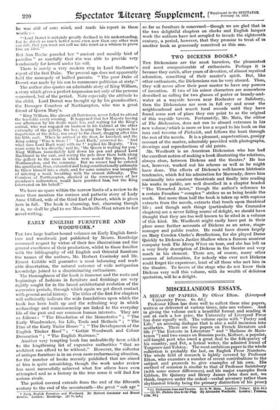TWO DICKENS BOOKS.* THE Dickensians are the most harmless, the
pleasantest and most companionable of enthusiasts. Perhaps it is
because they catch, after years of devotion, of almost mystical adoration, something of their master's spirit. But, like other enthusiasts, the Dickensians can be very absurd. Thus, they will never allow their poor master to have any powers of invention. If two of his minor characters are somewhere
described as calling for two glasses of porter or brandy-and- water at a wayside tavern near Rochester or Salisbury,
then the Dickensians are soon in full cry and scour the neighbourhood and search local records until they have found some sort of place they can point to as the original of this wayside tavern. Fortunately, Mr. Matz, the editor
of The Dickensian, does not run to absurd extremes in his new volume,' which is more or less a sequel to his book on the inns and taverns of Pickwick, and follows the hunt through
the rest of the novels. It is a pleasant, unpretentious, gossipy account of the matter, admirably provided with photographs, drawings and reproductions of old prints.
Mr. Woollcott is an American Dickensian who has had the excellent notion of making a book illustrating the relations, - always close, between Dickens and the theatre' He has not, however, worked out his scheme as well as he might have done. The effects of Dickens's well-known histrionic, tendencies, which fed his admiration for Macready, drove him continually into amateur theatricals and finally into reading his works in public, are well described in a chapter headed " The Thwarted Actor," though the author's reference to a certain Freudian " complex " strikes us as being beside the mark. But more than half the book is taken up with copious extracts from the novels, extracts that touch upon theatrical life ; and though such things (particularly the Crummles
chapters) are a never failing source of delight, we should have thought that they are too well known to be cited in a volume of this kind. Mr. Woollcott might easily have put in their place some further accounts of Dickens as an actor, stage- manager and public reader. He could have drawn largely on Mary Cowden Clarke's Recollections, for she played Dame Quickly to Dickens's Justice Shallow when a famous amateur company took The Merry Wives on tour, and she has left us a very lively description of Dickens in the theatre and very much in his element. There are, of course, many other sources of information, for nobody who ever met Dickens could forget the experience, least of all those who met him in the theatre. To lovers of the stage who do not know that Dickens very well this volume, with its wealth of delicious quotation, will be a delight.


































































 Previous page
Previous page